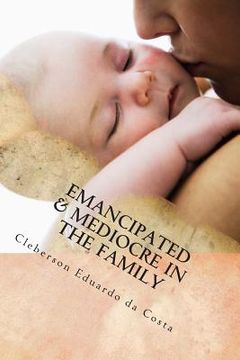Synopsis "Emancipated & Mediocre in the Family"
EMANCIPATED & MEDIOCRE IN THE FAMILY was born from a rereading, the need to give a new meaning to the paradox between the thought of the two great philosophers: Aristotle, thinker of origin Macedonia, divergent disciple of Plato, of ancient Greece, (b.c. ); and Jean Paul Sartre (1905-1980) existentialist philosopher of the 20th century. Epistemologically, this problem is situated between two distinct theories of be: Aristotle, centered in the conceptions of the Act and the Power, characterized in the purposes of be, or is, that might be the basis of what it is; AND the design of Sartre, contrary to Aristotle, who advocates that "the being is what it is", i.e. that it is not a be closed in on himself, in a nature, but open to a Human Condition. The new direction, the rereading, consists exactly in a further study, specifically as regards the Aristotelian conceptions of man, in which one sees, it is discovered, two different meanings for the term purpose: The first, as objective (target to be achieved); The second, in order to that something is intended (predetermination). What if reveals is that, all other human beings, in the theory of the Act and the Power of Aristotle, unlike man, are designed as irrational beings, and, therefore, within a conception of purpose, by nature, deterministic and/or pre-deterministic. However, with regard to man, there is a purpose, but not as predetermination, and yes as a target to be reached. In other words, there is something in open, a "what to do" human, a condition that must be met for that man becomes man in fact, much beyond simply man be born, grow and die. Aristotle defined man as a rational being by nature (but as a target to be reached, not in the sense of determination) and considered the rational activity, the act of thinking, such as the essence of that purpose, that is, as the live according to his reason. He said that, to be happy, to be held as a man, that reason should control the acts of its ethical conduct, guiding you through the practice of virtue. Theorists who focused specifically in the conceptions of the Act and of Power, without understanding that there was an exception to this rule specifically relating to man, to "be a man", given that Aristotle had a parallel theory, specific for the human being, not understood Aristotle as it should have been and, as Sartre, even with all its grandeur and magnitude philosophical, thought they were evil. Aristotle, to speak of ethical conduct, the practice of virtue, the pursuit of happiness, he speaks of the need for the existence of a human condition humanized in man, in consistency with the rationality, so that he in fact does humanize, but not of any condition called human, and yes, one that allows him to humanize, become human being in fact. Seeking support in Nietzsche, in their assessments of that "man is a bridge that goes from the animal in addition to him even", as well as the epistemological fundamentals existentialists, and, by comparing dialectically these knowledges with the historical problems of social exclusion and economic, especially in this century, we arrived at axiom that: Men far from a human condition humanized in fact, distant from the exercise of their rationalities, in addition to not perform while human beings in fact; in addition to not become men in fact, acquire, incorporate in itself any other existential condition paradoxical to a human condition humanized in fact, becoming slaves, animalized, alienated and, in the modern sense, excluded. In other words, precisely this is characteristic of the "opening of the human being" he can achieve its target, in fact as a man, as far as it can be anything else; as much as you can have in any other condition inauthentic, dehumanized, animalized, when away from their purpose, unlike all other beings. We, therefore, this does not make the man as man, this human condition not humanized the man, especially in societies western capitalist...

